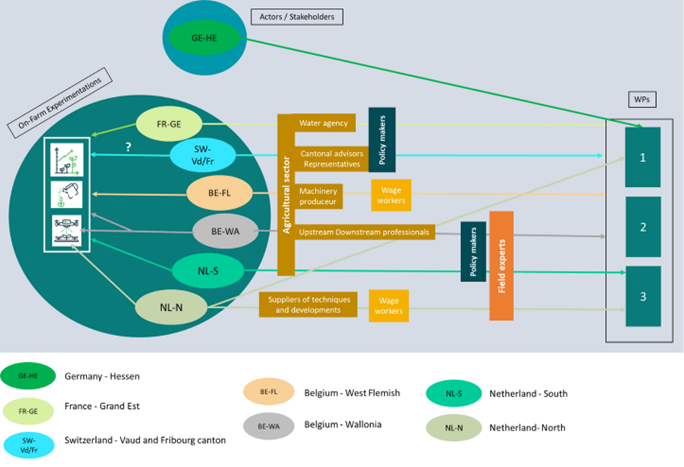Since its launch in January 2024, the SIMONE project has made significant progress. The first General Meeting, held online on 10 September 2024, provided the opportunity to review the work accomplished so far and discuss future steps. During this meeting, a participative workshop was organised, focusing on how to strengthen transregional cooperation within On-Farm Experimentations. Additionally, SIMONE’s first motion design promotional video was released.
Main highlights
Six months after the kick-off of the project, partners take stock of activities that have already begun and those planned for the future. The general assembly opened with a review of the main activities carried out by the coordination team, along with the reporting process for this first six-month period. Each work package provided an update on their activities, and all tasks planned for period 1 have been successfully completed. During the first period, the communication and dissemination strategy was also released. It outlines the objectives, target groups, and key messages, and provides guidelines to ensure effective communication and dissemination activities.
Another key outcome of the meeting was the steering committee's approval of the creation of a strategic advisory board. This board will include associated partners and organizations that have expressed interest in following the project’s activities. It will have access to the project’s main results and progress, and will also contribute by offering external opinions on certain activities and outputs.
Engaging Living Labs
For the first work package, which focuses on stakeholder engagement, all living labs have been set up or are in the final stages of consolidation (see Figure 1). Strong collaboration with project partners is expected to soon finalize the list of appropriate agronomic, ecological, economic, and social indicators and variables. These will be used to assess innovative agroecological measures and their interactions.

Figure 1: Living labs organization in SIMONE
Simulation of the best agroecological measures
Regarding the second work package, the first methodological guide on how to build and implement participatory simulators (using Bayesian networks and DAG/Directed Acyclic Graphs) is now available. A training course is scheduled for December in Paris. Arvalis has made the CartoDAG tool accessible to partners to assist them in designing their participatory simulators. Additionally, an agreement has been signed with the ongoing COMBHERPIC project on weed control - allowing data to be shared between the two projects and mutualizing team efforts. This collaboration enables SIMONE to benefit from two years of work on weed management for the development of its simulators.
Farmer-centric innovations
Finally, with respect to the last work package dedicated to On-Farm Experimentations (OFE), the first trials ran by farmers will be set up in 2025. While activities in this work package are still under discussion, significant progress has been done in defining common indicators to be collected on the field.
Divided into small groups, partners brainstormed about different approaches that could be implemented in SIMONE to strengthen transregional cooperation within OFE. The key ideas include:
- Organizing cross-visits with students, farmers, and experts to explore advanced OFE and disseminate project results.
- Facilitating cross-fertilization to share successes and reflect on specific topics among farmers, experts, and stakeholders.
- Establishing cross-collaboration for farmers and experts to exchange experiences on challenges encountered during the season or leverage existing events.
Promotional video
The promotional video for SIMONE was released for the first time during the general assembly. This communication support will allow all partners to promote SIMONE and increase awareness about the project. Created in motion design, the video effectively illustrates the structure of the SIMONE project and its impact. It targets policy makers at regional and national levels to emphasize the need to support the agroecological transition by shaping adapted policies and developing policy tools, in particular through active engagement in living labs. The general public is also targeted to promote the benefits of adopting agroecological practices. The aim was to highlight the specificity and innovative methodologies used in SIMONE, such as living labs, participatory simulators (DAG), and on-farm experimentation. The video underscores the open innovation approach implemented in SIMONE, the participative and inclusive way of doing research along with cross-border knowledge exchange. Farmers, surrounded by all key actors, are portrayed as the driving force behind the agroecological transition in their territories.
More info
Pascaline Pierson, Coordinator of SIMONE project and Manager of Arvalis' Saint-Hilaire-en-Woëvre experimental station.